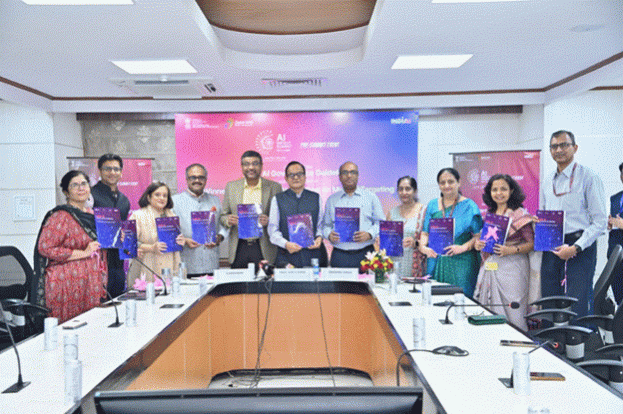
The Government of India has officially launched the Guidelines for Responsible AI Governance, marking a significant step toward ethical and inclusive AI adoption. The document was unveiled by Prof. Ajay Kumar Sood, Principal Scientific Adviser to the Government of India, in the presence of Shri S. Krishnan, Secretary, MeitY; Shri Abhishek Singh, Additional Secretary, MeitY, CEO IndiaAI Mission, DG NIC; Ms. Kavita Bhatia, Scientist 'G' & COO, IndiaAI Mission; and Prof. B. Ravindran, IIT Madras.
Also present were Dr. Preeti Banzal and Dr. Parvinder Maini from the Office of the Principal Scientific Adviser. The launch precedes the upcoming India–AI Impact Summit 2026, reinforcing India's leadership in shaping responsible AI frameworks.
The guidelines outline a robust governance framework to foster innovation while ensuring AI safety and accountability. The framework includes:
- Seven guiding principles (Sutras) for ethical AI.
- Recommendations across six pillars of governance.
- A phased action plan spanning short-, medium-, and long-term goals.
- Practical guidelines for industry, developers, and regulators.
Shri S. Krishnan emphasized that the approach prioritizes human centricity, stating, "Our focus remains on using existing legislation wherever possible. At the heart of it all is ensuring AI serves humanity and benefits people's lives while addressing potential harms."
Prof. Ajay Kumar Sood added, "The guiding principle is simple — Do No Harm. We aim to build flexible sandboxes for innovation and risk mitigation. The IndiaAI Mission will enable this ecosystem and inspire nations, especially across the Global South."
Shri Abhishek Singh highlighted the consultative process behind the framework: "The committee engaged in extensive deliberations and public consultation. The strong participation from stakeholders shows collective commitment. India remains focused on making AI accessible, affordable, inclusive, and trustworthy while driving innovation and economic growth."
Prof. @AjaySoodIISc, @PrinSciAdvGoI, joined Shri S. Krishnan, @SecretaryMEITY; Dr. Parvinder Maini, Scientific Secretary, OPSA; Shri @abhish18, Additional Secretary, MeitY and CEO @OfficialINDIAai; Prof. @ravi_iitm, @iitmadras; senior officials, and distinguished guests for the… pic.twitter.com/JVdDSwhtww
— Office of Principal Scientific Adviser to the GoI (@PrinSciAdvOff) November 5, 2025
The guidelines were drafted by a high-level committee chaired by Prof. Balaraman Ravindran of IIT Madras, with contributions from policy and industry experts including Debjani Ghosh (NITI Aayog), Dr. Kalika Bali (Microsoft Research India), Rahul Matthan (Trilegal), Sharad Sharma (iSPIRT Foundation), and others.
Serving as a foundational reference for policymakers, researchers, and industry leaders, the guidelines aim to advance national and global collaboration toward safe, responsible, and inclusive AI development.
Commenting on the development, Probir Roy Chowdhury, Partner, JSA Advocates and Solicitors, said, "These guidelines serve as a foundational reference for policymakers, researchers, and industry to strengthen cooperation for safe, responsible, and inclusive AI adoption. For businesses, this translates into improved accountability and compliance by design. Companies should build robust risk assessment frameworks and consider adopting voluntary compliance measures — which I believe will soon become the baseline for safe and trusted AI deployment."
In addition to unveiling the national Guidelines for Responsible AI Governance, the event also announced the winners of the IndiaAI Hackathon for Mineral Targeting, organised under the Applications Development Pillar of the IndiaAI Mission, in collaboration with the Geological Survey of India (GSI), Ministry of Mines.
.@GoI_MeitY unveils India AI Governance Guidelines under IndiaAI Mission to Ensure Safe, Inclusive, and Responsible Adoption of Artificial Intelligence across Sectors
— PIB India (@PIB_India) November 5, 2025
Launch of India AI Governance Guidelines Marks Key Milestone in Building Robust Framework for Responsible, Safe,… pic.twitter.com/5yYt0XAq3F
The hackathon aimed to leverage AI and machine learning to advance mineral prognostication by analysing geological, geophysical, geochemical, and remote-sensing data. The winning teams were recognised for their exceptional AI-driven solutions:
- First Prize (₹10 lakh): CricSM AI — Critical and Strategic Mineral Mapping with AI by Prof. Partha Pratim Mandal, Dinesh Munda, Litan Dutta, Tanmay Singh, Sai Satyam Jena, and Dr. Pradeep Kumar Shukla.
- Second Prize (₹7 lakh): Knowledge and Data-Driven Mineral Targeting Approach by Soumya Mitra, Saptarshi Mallick, Kshounish Patra, and Santu Biswas.
- Third Prize (₹5 lakh): SUVARN: Semi-Unsupervised Value-adaptive Artificial Resource Network by Sayantani Bhattacharya, Dr. Sabyasachi Nag, Arun A., and Yavthish Kannaa G. S.
- Special Prize (₹5 lakh): For AI and ML solutions identifying new potential areas for exploration of critical minerals such as REE, Ni-PGE, copper, diamond, iron, manganese, and gold by Deepa Kumari, Anamika Choudhary, and Sandhya Jagannathan.
The announcements mark another milestone in India's mission to foster safe, inclusive, and scalable AI innovation, as the nation prepares for the India–AI Impact Summit 2026, to be held on 19–20 February 2026 in New Delhi. The Summit will bring together global leaders, policymakers, researchers, and industry experts to deliberate on the transformative role of AI in advancing People, Planet, and Progress.

















